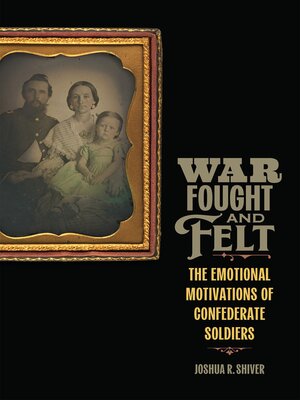War Fought and Felt
ebook ∣ The Emotional Motivations of Confederate Soldiers · Conflicting Worlds: New Dimensions of the American Civil War
By Joshua R. Shiver

Sign up to save your library
With an OverDrive account, you can save your favorite libraries for at-a-glance information about availability. Find out more about OverDrive accounts.
Find this title in Libby, the library reading app by OverDrive.



Search for a digital library with this title
Title found at these libraries:
| Library Name | Distance |
|---|---|
| Loading... |
Joshua R. Shiver's War Fought and Felt advances our grasp of the links between masculinity, emotion, and relationships during the American Civil War. It is the first broadly researched, multidisciplinary, and statistically supported approach to understanding the pivotal role of emotions in the everyday lives of Confederate soldiers. Using a source base of more than 1,790 letters and diaries from two hundred Confederate soldiers from North Carolina and Alabama, it builds upon traditional sociocultural and ideological arguments for why Confederate soldiers fought. Drawing on history, psychology, sociology, philosophy, and neuroscience, it underscores the necessity of examining primal emotions when looking to understand soldiers' motivations. It argues that the heightened emotions felt by these soldiers drove them to suffer, fight, desert, and willingly die.
Shiver examines the vital role of emotions within the context of soldiers' relationships with their parents, children, wives, sweethearts, and comrades. These relationships and the emotions they engendered defined Confederate soldiers' firsthand experiences of war and ultimately redefined the Confederate cause itself. A war that began steeped in ideology ended, for the soldiers, as one fought for the protection and future of one's loved ones. Shiver demonstrates that the emotionally overwhelming nature of the war forced a tectonic shift in American masculinity in which the prewar emphasis on stoic individualism gave way to an outpouring of emotional expression and mutual interdependence. As a result, Confederate soldiers pragmatically embraced emotional and relational norms that were previously considered taboo.
By placing emotion alongside traditional ideological and sociocultural explanations for motivation, Shiver sheds light on a new area of research that promises to promote a deeper understanding of why the American Civil War was one of the bloodiest, most emotionally influential, and world-changing events of the last two centuries.







